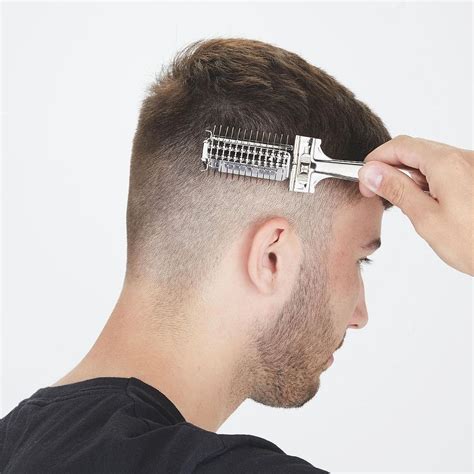Introduction
Hair clipping is a versatile styling technique that allows men to achieve a wide range of looks, from classic fades to edgy undercuts. With the right clippers and some practice, you can create salon-quality haircuts at home.

Types of Hair Clippers
- Rotary clippers: Use a rotating blade to cut hair quickly and evenly. Best for thick or coarse hair.
- Pivot clippers: Have a pivoting blade that adjusts to the contours of the head. Ideal for fading and blending.
- Cordless clippers: Offer greater freedom of movement but require regular charging.
Choosing the Right Clipper Guards
Clipper guards determine the length of your haircut. Commonly used guard numbers include:
| Guard Number | Hair Length |
|---|---|
| 0 | 1/16″ or less |
| 1 | 1/8″ |
| 2 | 1/4″ |
| 3 | 3/8″ |
| 4 | 1/2″ |
Basic Hair Clipping Techniques
1. Fading: Gradually transition from shorter to longer hair lengths using different clipper guards.
2. Blending: Smoothly connect different hair lengths using overlapping clipper strokes.
3. Undercutting: Cut the bottom section of hair shorter than the top to create a high-contrast look.
Advanced Hair Clipping Styles
1. High and Tight Fade: Fade the hair up to the scalp, leaving a short buzz cut on top.
2. Low Fade: Fade the hair from the lower neck to the crown, creating a subtle blend.
3. Bald Fade: Fade the hair from the scalp to the point of baldness.
4. Faux Hawk: Create a Mohawk-like style by fading the sides and leaving a longer strip of hair in the center.
Essential Hair Clipping Products
- Hair clippers: Choose a high-quality clipper that suits your hair type and desired styles.
- Clipper guards: Invest in a set of guards to achieve different hair lengths.
- Beard trimmer: Use a separate trimmer for detailed beard styling.
- Hair spray: Hold your style in place without weighing it down.
Hair Clipping Tips for Beginners
- Practice on a mannequin before cutting your own hair.
- Start with longer guards and gradually work your way down to shorter ones.
- Use sharp clippers to ensure a clean cut.
- Pay attention to the direction of hair growth to avoid uneven results.
- Don’t be afraid to experiment and create your own unique styles.
Health and Safety Considerations
- Clean your clippers and guards regularly to prevent bacteria buildup.
- Use sharp blades to avoid pulling or tearing hair.
- Protect your eyes from flying hair by wearing safety glasses.
- If you have sensitive skin, use hypoallergenic products.
FAQs
- How often should I clip my hair? Depends on your hair growth rate and desired style. Generally, every 2-4 weeks.
- Can I cut my hair wet or dry? Dry cutting allows for greater precision, while wet cutting is easier for beginners.
- What are the common mistakes to avoid? Over-cutting, pulling hair, not fading smoothly, and not using sharp clippers.
Conclusion
With the right clippers, techniques, and products, you can achieve professional-looking hair clips at home. Practice and patience will help you master the art of hair clipping and create a variety of stylish looks.
